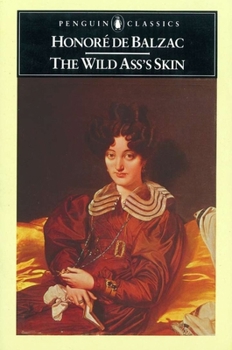The Wild Ass's Skin
Select Format
Select Condition 
Book Overview
Balzac is concerned with the choice between ruthless self-gratification and asceticism, dissipation and restraint, in a novel that is powerful in its symbolism and realistic depiction of decadence. For more than seventy years, Penguin has been the leading publisher of classic literature in the English-speaking world. With more than 1,700 titles, Penguin Classics represents a global bookshelf of the best works throughout history and across genres...
Format:Paperback
Language:English
ISBN:0140443304
ISBN13:9780140443301
Release Date:September 1977
Publisher:Penguin Group
Length:288 Pages
Weight:0.48 lbs.
Dimensions:0.7" x 5.1" x 7.8"
Age Range:18 years and up
Grade Range:Postsecondary and higher
Customer Reviews
4 ratings
Great intuition spoiled by not enough depth
Published by Thriftbooks.com User , 17 years ago
This is a quite interesting and charming novel even for someone who is not exactly a passionate reader of the 'classics'. The central idea, an ancient talisman with the power to make wishes come true, but shrinks with every desire that becomes true is fascinating and deeply philosophical and "human". I think Balzac should have elaborated more on this idea, exploring the dimensions of human desire and discovering more complex and deep characters for his novel. Instead, making the talisman work also for very trivial and passing desires, makes the while situation almost comical and superficial. It looks like Balzac didn't take himself too seriously with this novel and saved his efforts. Pity, but this is still a fascinating read.
Skin of Chagrin
Published by Thriftbooks.com User , 18 years ago
O.K. A minority opinion. Nowhere are the master storyteller's considerable talents more admirably on display than in this quintessential commentary on the futility of desire. What is the locus of Balzac's genius? One of the all-time masters of character development, Balzac allows us a deeper appreciation of interiority. What perhaps disturbs certain modern and post-modern readers about La Peau de Chagrin, derives from their delimiting reliance on the modern scientific world view. The very idea of a talisman - which certain magical powers - a love potion - is `hokey' or `wacky'. Of course, U.F.O.'s are somewhat plausible and `ring viruses' even moreso. If the vehicle might seem uncomfortably quaint to some, the dignity of the project is, I feel, hardly compromised. Of course, we have that memorable, if not prototypical, B-film, "Into the Night", which seems to indicate that in fiction, weird things can still be acquired at antique stores and junk shops. The question raised is however whether Balzac does bring his A-game to La Peau de Chagrin, and I claim most emphatically: A +. What is offered here is not dime store murder mystery fare (the genre of Earl Stanley Gardner, E. Howard Hunt, Dan Brown, et al) . . . but mortality mystery in dime store guise. Underlying the superfluity of our celebrated romantic angst is the dark inevitability of our certain doom. What Balzac wishes us the see in the tragic absurdity of his characters' collective fate, is that the doom and the desire are commensurate. If as we live, we die, if our inexorable desires are fatally predatory upon our better sense, what is the point of living, where is the meaning? This query, Balzac poses most seriously in his elsewhere acknowledged masterpiece, and for better or worse, we are still trying to answer that sphinxian riddle.
A chilling tale of the destructive powers of desire
Published by Thriftbooks.com User , 25 years ago
In this fairly early Balzac novel, part of his grand "La Comedie humaine" project (in which he set out to describe every aspect of French society with interwoven plots), Raphael, a young and destitute nobleman, acquires a talisman with particular powers. This patch of chagreen skin, its Arabic inscription promising to fulfill his will, also grows smaller every time a wish is granted -- and with it, his lifespan. A struggle begins worthy of Stephen King horror. Raphael must either somehow stop the talisman's shrinking or try to bring his will to a screeching halt. Mixed in is the story of a beautiful but heartless woman he desires. (This part, to be honest, gets a bit dull at times, though it is somewhat crucial to Raphael's psychological portrait.) This wasted venture prevents him from being closer to the simpler but caring girl who deserves his love. Balzac's father believed that the human will ultimately saps a person of his life if overexerted. In this short novel, Balzac explores this idea with flair and wit, and maybe a bit too much on-the-couch psychoanalysis.
Solid Balzac
Published by Thriftbooks.com User , 25 years ago
This is bo no means the man's best book. I have read 4 of his other works and this is the worst yet it is still an excellent book.The plot focuses around Raphael, a depressed man who acquires a talisman that will grant your wishes. The catch is everytime you make a wish, the talisman diminishes, as does your health. The book is divided up almost into three seperate parts. The first deals with Raphael going to an elegant diner with colleagues followed by an orgy. The second part is cloddish and long as it discusse Raphael's romance towards Foedora. She is a sly temptress who really comes across as an uncompelling ice queen. Why Raphael would go after her is beyond me.The third part features the books most touching moments and also its most wonderful imagery. This is where Raphael flees to the country and ponders his existence.Overall a good book, worth reading and all of that. If you are considering Blazac read Eugenie Grandet and Ursule Mirouet first. Then read La Pere Goriot and Cesar Birrotteau. They are all far more compelling books.






